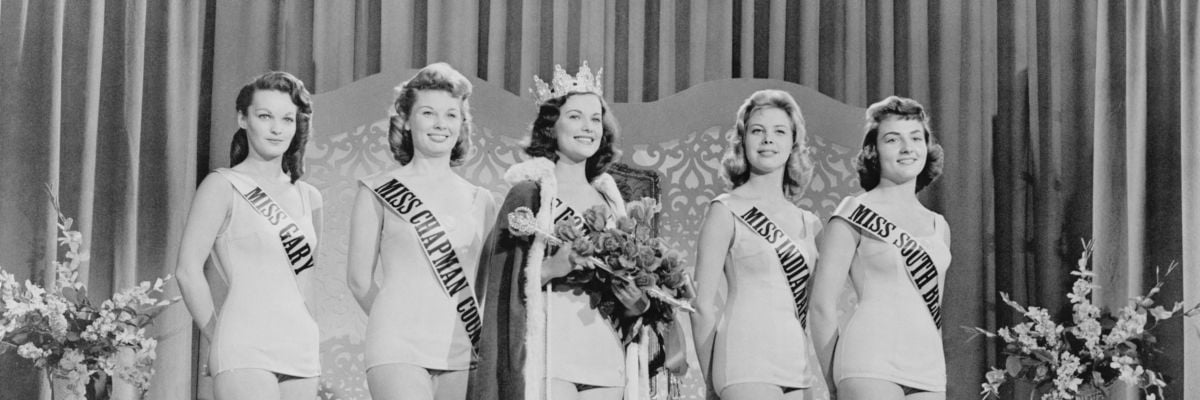
Take my children to a store, and they will gravitate toward the shiniest, gaudiest objects. As an adult, I can see these things for what they are—pieces of cheap plastic in the shape of rare gemstones—but from a young one’s perspective, they are real treasures.
When I was a kid, I was attracted to the same types of things, and when it came to beauty pageants, I had a deep love for all the glitter. The shiny sequins and sparkly crowns and beautifully made up faces drew me in, like a little magpie who spotted a glimmering something in the sunlight.
Somehow, I got my hands on a beauty pageant magazine. I pored over it . . . for years! The tiaras, the evening wear, the photos of exotic locales. And then to watch the pageants on TV! I loved to see the young women smile and wave as they departed the tour buses and took photos with Mickey Mouse at Disneyland or walked along a white sandy beach in the days leading up to the show. It was all so attractive. It caught my attention as much as the gold-painted bauble at the dollar store checkout line catches my children’s eye.
But as an adult, I see the beauty pageant industry—and beauty itself—very differently. That’s all the more true as a Catholic.
There is nothing wrong with beauty or being attracted to it. Beauty is, after all, a transcendental (or near enough, depending on which philosopher you ask) sister to Truth and Goodness, a way of elevating our hearts and minds from the physical to the transcendent. The Catechism says, “All creatures bear a certain resemblance to God, most especially man, created in the image and likeness of God. The manifold perfections of creatures—their truth, their goodness, their beauty all reflect the infinite perfection of God” (41). Beauty draws us in and, if we let it, upward. Sacred art, the towering spires of a cathedral, the writings of the saints . . . these beautiful creations point us to the Most Beautiful, our Creator.
For those who reject God or do not know him, there is a danger of attributing the beauty of creation to the creation, taking God out of the equation. But we should understand that, as the latter half of CCC 41 says, “from the greatness and beauty of created things comes a corresponding perception of their Creator.” For the beauty pageant contestant or fan, beauty may be the final destination, rather than a guidepost leading to God.
In this domain, vanity is a natural consequence of an over-reliance on our physicality, different from though in the same family as pride. The two together comprise two of the three root sins in our Christian tradition. As defined in Fr. John Hardon’s Modern Catholic Dictionary: “Where pride, though sinful, may have some foundation in fact for whatever one prides oneself on being or having done, vanity is the idle effort to obtain recognition or respect for what a person does not have a rightful claim to. Vanity is attributed to shams, which lack substance and are deceitful (like human praise); or to things without solidity and permanence (such as physical beauty).”
“Vanity,” says Pope Francis, “sows wicked anxiety, takes away peace.” And what peace has been taken from the child pageant participant who has grown up, or the adult beauty pageant participant who judges herself too harshly! Studies have shown that at no matter the age of the participant, those who strut the stage are riddled with anxiety, low self-esteem, and poor self-kindness. These are people who have been judged on their physical appearance and how they carry themselves, and, despite pageant officials’ insistence that they are developing confidence, budgeting skills, perseverance, and more, these standards to which they are held weigh heavily, and sometimes tragically, upon them. The suicides of former Miss USA twenty-nine-year-old Cheslie Kryst and teenage pageant participant and former Toddlers & Tiaras star sixteen-year-old Kailia Posey highlight these mental health struggles at their most devastating. These are but two higher-profile examples of what we risk by developing an over-reliance on our physical selves and our achievements, rather than loving ourselves as whole, as beloved sons and daughters of God.
And when we don’t treat ourselves as a whole person, our lives can become riddled with disorder and dysfunction. In the pageant world, we see this particularly in the recent Miss Derry New Hampshire win by a transgender teenager named Brian and the attempted wedding of Miss Puerto Rico and Miss Argentina. In both instances, God’s design for human sexuality is thwarted and misused. That’s not to claim that pageants on their own are breeding grounds for sin, but with such a long history of judging women based on superficial and fleeting qualities (and despite recent attempts to “modernize” pageants, such as Miss America’s 2018 decision to remove the bathing suit competition from the show), it would be a difficult task to exist with two out of three root sins (pride and vanity) being so naturally foundational to the concept.
Is there hope for the pageant world to rise above a firm foundation in sin? Where once the pendulum swung so far in the direction of physical beauty and the accompanying vices, now it swings to the other extreme: applauding obesity, transgenderism, and lesbianism. Attempts to be reasonable do not seem to be in its forecast.
And so perhaps it is time to move past the age of beauty pageants and contemplate and enjoy beauty that isn’t so fleeting or judged so quickly as in a two-hour show. If parents of child pageant participants want to teach their daughters about self-worth and confidence and life skills, such as budgeting or how to win scholarship money, surely there are other activities that don’t risk permanently damage their young psyches. For adult pageant participants who crave the glitz and glamor, self-reflection ought to be employed. And for the fans of any age, let us contemplate beauty in a way that encourages holiness, elevating our thoughts from this world to the eternal beauty of the next and the Maker who created it in the first place.



